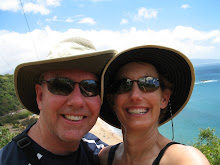Why is it that when one system isn’t working, the pendulum typically swings too far to the other side? Is it human nature to think that if there are problems the complete opposite is the solution? With any sweeping change, the consequences of throwing the baby out with the bath water, usually takes a few years to become apparent. We found no exception to this in South Africa. The country still appears to be in transition from decades of apartheid and will continue to be for some time to come.

During the course of our month in South Africa we had the chance to listen to many people’s stories. They told of their lives under and after apartheid. The issues are complex to say the least. This is a difficult topic for non writers, like us, to write about, but we‘re giving it a try as we feel that it is important to document our feelings on this heavy subject; for ourselves if no one else.

We talked with one man who’s family was forcibly moved when he was a young child. He was one of 60,000 people moved from just one area called District 6. Before the mass removal, the District 6 neighborhood was considered cosmopolitan and made up of a mixture of races and religions. Blacks, Arabs, Indians, colored (which we learned in SA means someone of a mixed race), Afrikaans and whites lived and worked side by side. We learned that the people were happy and productive. The government with it’s divisionist zeal, decided that it knows best. They concluded that interracial interaction breeds conflict, necessitating the separation of the races. Between 1968 and 1980 all of the families were relocated from District 6 to what is known today as Cape Flats about 25 kilometers away. In our opinion it is a bleak area and is probably in worse shape then District 6 ever was.


As you can imagine, there were lots of problems under Apartheid, including huge sanctions put upon South Africa by the wealthy nations of the world. Not many countries wanted to be associated with South Africa and it‘s oppressive policies. Finally the people rose up, the politicians saw the light and a new leader came into the fray (Nelson Mandela) and the end of the ugly era was negotiated.

We spent one month there and had a chance to look under the covers, talk with locals; get a deeper sense of the country. We were shocked to learn that for people between the ages of 18 and 34, unemployment is 50%. 50% of SA’s young people aren’t working. That staggering statistic leads to desperation. Desperation leads to crime and drug addiction. Therefore petty theft and car jackings are real threats. We were always on alert and told to stay off the streets at night. We didn’t, but we were ultra aware after dark.
We talked with one young employed Zulu man who shared with us his viewpoints of the issues. He thinks that two things are at the root of the post apartheid problems: 1). The tribal mentality in which the chief (president) can do no wrong; and 2). That black people see themselves as less then whites.
Coming from a black man’s perspective, we thought this opinion was brave, introspective and very honest. He is worried about his country and is doing what he can to help other young South Africans understand that even though Joseph Zuma, a Zulu, is the current president (chief) of the country, government leaders of today are not the same as tribal elders of yesterday. They should be held to a greater standard and not allowed to get away with some of the things Zuma is doing. He also admitted to us that many black people are having trouble retraining themselves to think that they are equal to whites. Too many of his fellow countrymen, still see themselves as servants and not as business people, doctors or lawyers. They still limit their own potential and don’t take advantage of educational opportunities, etc.
Fortunately there are movements afoot to drive some clearly needed changes in South Africa‘s government. Several ANC (African National Congress) opposition organizations are making a concerted effort to bring balance to the country. Zuma calls the groups poisonous snakes. Unfortunately, the main opposition party, the Democratic Alliance, is seen as the party for whites. It’s finding it very difficult to attract black people. It knows it won’t truly make a difference if it only has white members. But the group is having a tough time interesting blacks due to the deeply rooted belief that tribal chiefs are untouchable. It’s a fascinating national psyche. And one, that in our opinion, will take generations to evolve.
In the meantime, South Africa, is loosing smart people of all colors. Our friend Magedie, whom we met in his new homeland of Slovenia (via a postcard from Post Office Bay in the Galapagos Islands), is South African, a successful engineer, black, and can’t imagine returning to his home country other then to visit his family.
Barry and Francis, a dynamic, intelligent couple, whom we met in Peru and again in South Africa are in the process of leaving South Africa for good. They are nearing the end of a painstaking process of becoming Canadian citizens. (They’ll be our neighbors up in Vancouver, British Columbia!) Although these are just two examples of the brain drain that is occurring, they are first hand. We heard of many others as well - someone’s sister, son, best friend, etc leaving South Africa. 
















No comments:
Post a Comment